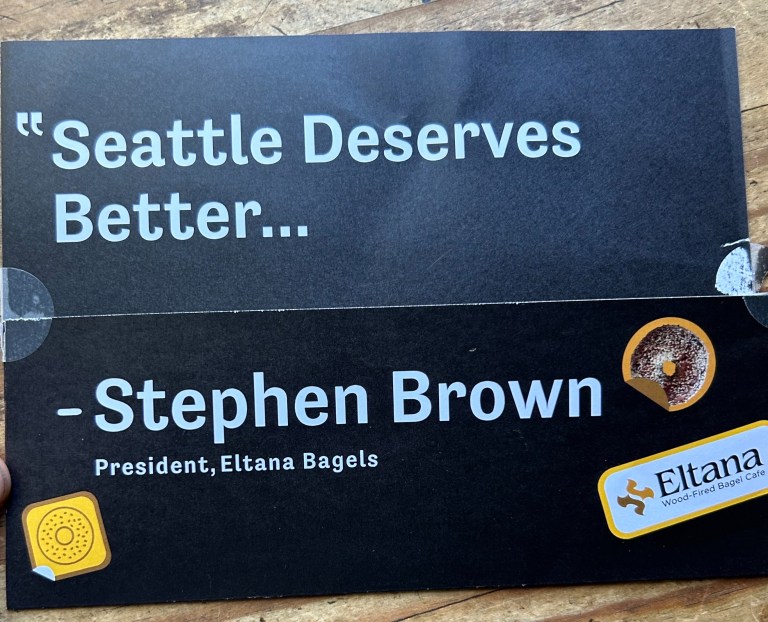1. In a last-minute endorsement (of sorts), Seattle City Attorney Ann Davison sent out a mass email on Saturday urging voters to support the city council candidates who have consistently supported legislation—which will almost certainly pass later this summer—that would empower her to prosecute drug users for simple possession and for using drugs, other than alcohol and marijuana, in public. The law would incorporate a new state law into city law, granting the city attorney the authortiy prosecute misdemeanor-level drug use and possession.
 The letter painted an apocalyptic picture of the city where Davison serves as chief local prosecutor.
The letter painted an apocalyptic picture of the city where Davison serves as chief local prosecutor.
“Parents should be able to take their kids on the bus without inhaling plumes of fentanyl smoke. We all should be able to walk in our parks and sidewalks without stepping over needles and drug paraphernalia. We should be able to get to work without dodging a gauntlet of drug deals,” Davison wrote.
“Unfortunately, some members of City Council voted not to allow Seattle to adopt our new State law on drugs. For me to have authority to prosecute and intervene, the new state law must be put into our city code by City Council.”
Although Davison’s letter, sent from her campaign email address, claims the proposed law would empower her to “intervene” in drug users’ cycle of addiction, the law itself is silent on intervention and diversion. In reality, according to a city council staff analysis, the legislation only gives the city attorney the authority to prosecute.
The city council candidates who unequivocally said yes to a Seattle Times survey question about prosecuting drug users, according to a survey conducted by the Seattle Times, are, in order of district: Rob Saka and Phil Tavel (District 1); George Artem and Ken Wilson (District 4); Boegert Bibby (District 5); Pete Hanning, Victoria Palmer, and Shea Wilson (District 6); Bob Kettle, Olga Sagan, Aaron Marshall, Wade Sowders, and Isabelle Kerner (District 7). District 7 incumbent Andrew Lewis also told the Seattle Times he supports prosecuting drug users, but because he cast the tie-breaking vote against the bill before saying he would support it, he does not meet Davison’s criteria.
2. Meta attorney Rob Saka, a frontrunner in District 1, may be the primary beneficiary of billboards and mailers advertising Eltana Bagels, the company founded by another D1 candidate, Stephen Brown. As we’ve reported, Brown has insisted the mailers and billboards, which look strikingly similar to his campaign materials, were just ordinary advertising for the Montreal-style bagel stores.
That didn’t stand up to scrutiny by the Seattle Ethics and Elections Commission, however: The mailers, which featured the phrase “Seattle Deserves Better…—Stephen Brown” and offered $25 in free bagels, look like campaign literature, and the billboards—which also featured Brown’s name—were mostly located in District 1, which does not have a single Eltana store. After conferring with Ethics and Elections director Wayne Barnett, the Brown campaign filed an amended campaign report that included $33,000 for the West Seattle portion of the mailing and billboards.

Last week, the ethics commission went even further, voting—in response to a request from Saka—to allow him to raise and spend more than $93,750, the maximum allowed under Seattle election law unless another candidate goes above the spending cap. Ordinarily, this happens when a candidate’s own campaign spending, plus independent expenditures on their behalf, breaches the cap, but the city also allows candidates to spend more than the mandatory maximum if another candidate violates election law.
Ironically, Saka himself has already benefited from tens of thousands of dollars in spending from an independent expenditure campaign backed by real estate moguls and a Trump-donating billionaire, putting him over the limit himself. Maren Costa, a labor-backed candidate, requested a lift on the cap for her own campaign and received it last week.
Because last week’s hearing was about Saka’s motion to lift the cap, the Brown campaign’s $33,000 valuation for the mailers was not in question. The commission will likely seek a new valuation, but hasn’t yet, so as of now, the old, under-the-limit valuation stands. This creates a bizarre Schrödinger’s cap situation in which the Brown campaign has both spent more than the legal limit (according to the ethics commission) and is within the limit (according to the commission’s executive director and the campaign itself).

 One one side, the Saka/Rivera mailers both promise “[Saka/Rivera] is endorsed by people you know and trust,” followed by a quote from a supporter (Community Police Commission member Harriett Walden and Attorney General Bob Ferguson, respectively) and a snippet of the Seattle Times’ endorsement for that candidate.
One one side, the Saka/Rivera mailers both promise “[Saka/Rivera] is endorsed by people you know and trust,” followed by a quote from a supporter (Community Police Commission member Harriett Walden and Attorney General Bob Ferguson, respectively) and a snippet of the Seattle Times’ endorsement for that candidate.






 The flyer (which opens to the word “Bagels!”) offers a half-dozen free bagels and a “spread of your choice”—a “more than $25 value!” to anyone who comes in to either of Eltana’s two locations, which are both located outside District 1. In small print below the offer, the mailer says the offer expires at the end of August and has “no cash value.”
The flyer (which opens to the word “Bagels!”) offers a half-dozen free bagels and a “spread of your choice”—a “more than $25 value!” to anyone who comes in to either of Eltana’s two locations, which are both located outside District 1. In small print below the offer, the mailer says the offer expires at the end of August and has “no cash value.”